November 19, 2021
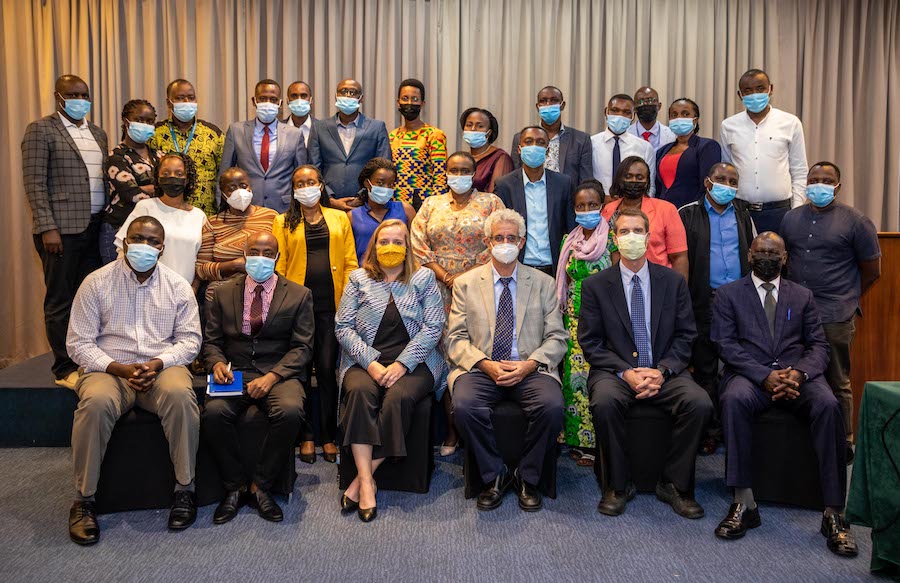
Group photo of attendees at the IMAKAZA closeout workshop
At the closeout workshop for the IMAKAZA project in November, Ciheb Rwanda and project stakeholders recognized IMAKAZA’s numerous accomplishments in HIV programming.
The PEPFAR-funded IMAKAZA project (Imakaza in the local language of Kinyarwanda means “to sustain”) is formally titled “Enhancing Sustainable and Integrated Health, Strategic Information, and Laboratory Systems for Quality Comprehensive HIV Services Through Technical Assistance.” It started in 2017 with the aim of institutionalizing national, provincial, and district HIV oversight and delivery systems to provide high-quality HIV service delivery.
Numerous stakeholders and partners attended the event, held at the Hôtel des Mille Collines in Kigali, Rwanda, including leadership from PEPFAR, Centers for Disease Control and Prevention (CDC) Rwanda, the Rwanda Biomedical Centre (RBC), Rwanda Ministry of Health (MOH), and the University of Maryland, Baltimore (UMB). Below are select quotes from the speakers at the event:
“We have been involved in supporting the RBC in developing guidelines, standard operating procedures, and training materials.” - Dr. Cyprien Baribwira, Ciheb Rwanda Country Director.
“In partnership with the RBC, we developed a CQI platform that facilitates real time CQI tracking and helps mentors identify performance gaps and carry real time support. This was piloted in five PEPFAR Kigali sites and scaled up to 111 high volume clinics countrywide.” - Dr. Jackson Sebeza, Ciheb Rwanda Program Director.
“We at UMB aren’t leaving Rwanda. We plan to continue supporting the efforts towards HIV epidemic control.” - Dr. David Riedel, Ciheb Medical Director.
“The work highlighted today will help us make the project stronger for healthcare beneficiaries.” – Alexandra Hoagland, PEPFAR Coordinator.
“Through IMAKAZA, we celebrate the implementation of CQI processes in 111 high volume facilities in Rwanda” - Dr. Thierry Roels, CDC Rwanda Country Director.
“I have been impressed by the tremendous results achieved through the implementation of IMAKAZA project” - Dr. Janvier Serumondo, Rwanda MOH.
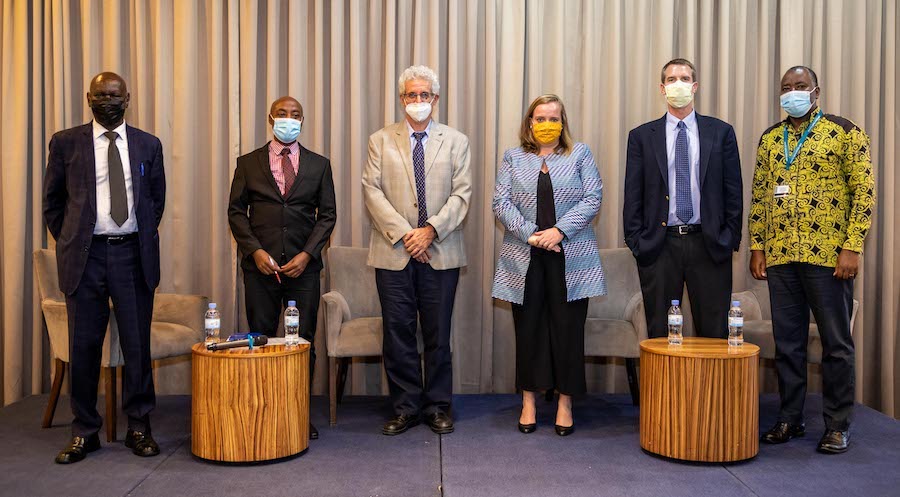 Speakers at the meeting (L to R): Dr. Cyprien Baribwira, Dr. Janvier Serumondo, Dr. Thierry Roels, Alexandra Hoagland, Dr. David Riedel, Dr. Jackson Sebeza
Speakers at the meeting (L to R): Dr. Cyprien Baribwira, Dr. Janvier Serumondo, Dr. Thierry Roels, Alexandra Hoagland, Dr. David Riedel, Dr. Jackson Sebeza
Throughout the five years of implementation, IMAKAZA has supported the Rwanda MOH across initiatives that include:
- Updating the National Guidelines for Prevention and Management of HIV.
- Developing HIV e-learning training materials to be used for healthcare providers in antiretroviral clinics across the country.
- Developing clinical mentorship guidelines incorporating continuous quality improvement (CQI) principles.
- Building a laboratory information management system (LIS) to strengthen the capacity and quality of the country’s laboratory network to support HIV diagnosis, prevention, care, and treatment; disease monitoring; and surveillance.
- Piloting an HIV integrated care model in an outpatient department.
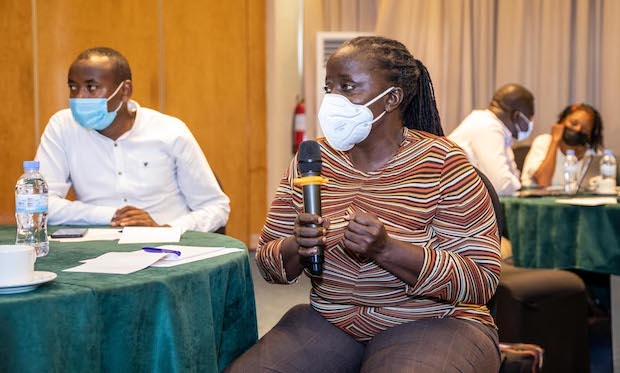 An attendee asks a question during the workshop
An attendee asks a question during the workshop
Among IMAKAZA’s achievements are:
- Developing several open-source solutions to electronically manage HIV laboratory data
- Providing trainer of trainers and developing accompanying user manuals for each solution
- Interfacing 13 decentralized viral load (VL) hubs with Roches and Abbot machines
- Providing viral load sample tracking system online login access for viral load requests to all 602 facilities
- Trained more than 1,200 healthcare workers, especially on PEPFAR new initiatives
- Trained 548 healthcare workers on CQI principles and application
The project still has several tasks as part of the closeout process. Ciheb Rwanda staff will support the National Reference Lab to improve capacities in systems to aid healthcare providers in utilizing e-lab systems to improve patient outcomes, train the Laboratory Information System team in programming language, and discuss with the Health Management Information System about linking digital platforms with the District Health Information System (DHIS) 2 dashboard.
Contact
Center for International Health, Education, and Biosecurity
Institute of Human Virology
Anthony Okoth
Regional Communications Specialist
Related stories
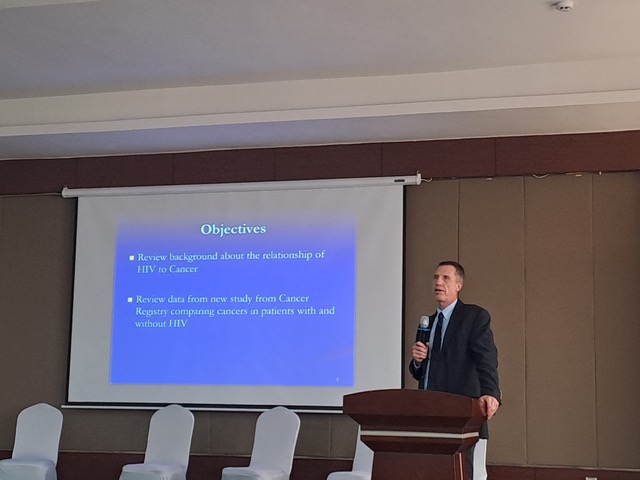
Monday, August 14, 2023
Ciheb Rwanda Takes Part in Cancer Prevention and Control Stakeholders’ Review Workshop
The primary goal of this workshop was to share the advancements made in the implementation of the National Cancer Control Program (NCCP), cancer registry data, and research dissemination. Additionally, the participants discussed challenges and devised joint plans to accelerate cancer prevention and management efforts in Rwanda.
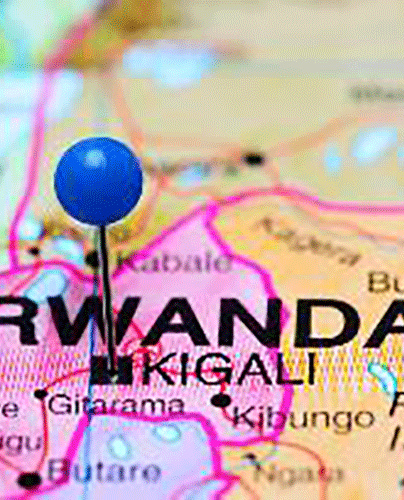
Tuesday, November 15, 2022
NINGO's Strategic Partnership for National Transformation Held in Rwanda
Leadership from the University of Maryland, Baltimore’s (UMB) Ciheb Rwanda attended the Network of International Non-Governmental Organizations (NINGO) forum meeting on the 15th of November at the Kigali Convention Center.
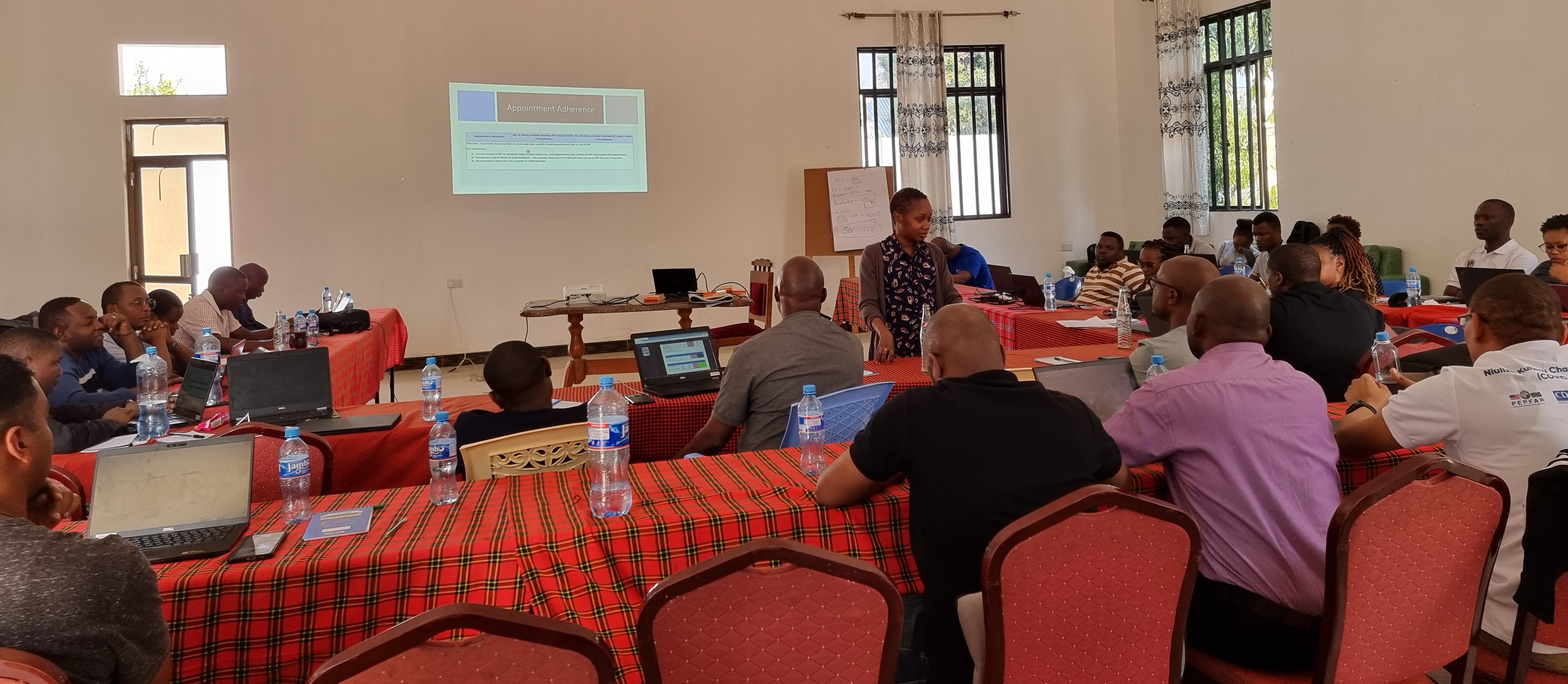
Monday, August 15, 2022
UMB's Ciheb Tanzania Holds CQI Indicators Workshop
Adopting Continuous Quality Improvement (CQI) processes is an approach for accelerating progress towards attainment of the 95-95-95 global HIV targets.
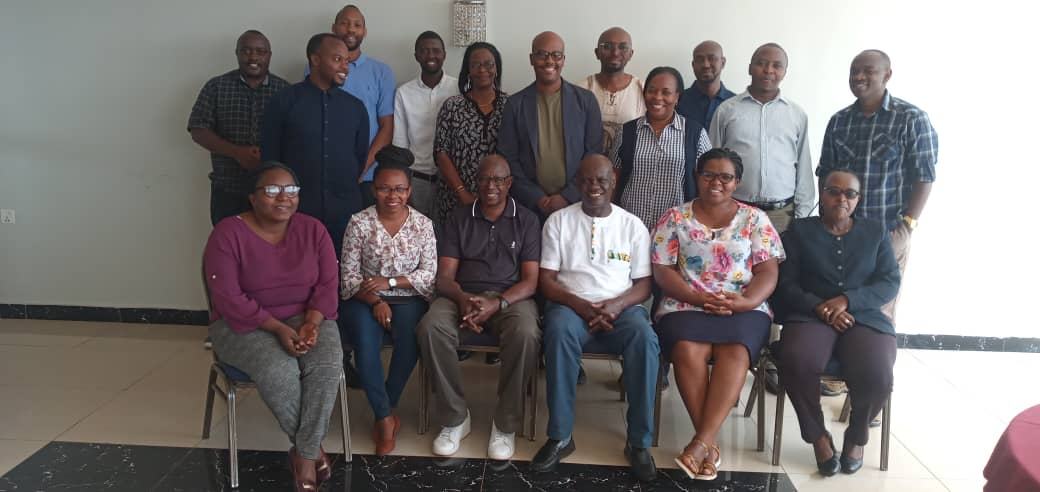
Friday, July 15, 2022
Rwanda takes part in One Health Multi-Sectoral Coordination Mechanism
The One Health approach presents an opportunity for stakeholders, including UMB’s Ciheb Rwanda, to contribute to the management of public health challenges.

Wednesday, September 01, 2021
Reducing Mother-to-Child Transmission of HIV in Rwanda
An ongoing Ciheb Rwanda partnership with UNICEF is tapping into Ciheb’s expertise in continuous quality improvement (CQI) to design strategies and interventions to reduce mother-to-child transmission of HIV at 18 healthcare facilities in the capital city of Kigali.

